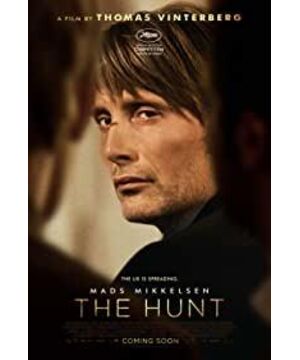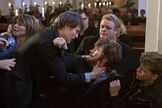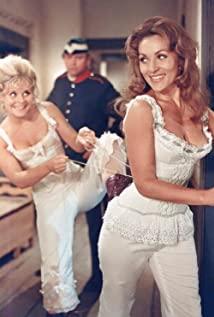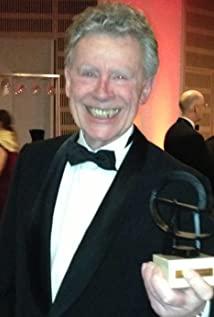Every time they watch the news with the older generation, when the news broadcasts that someone sexually assaults a child or someone rapes and kills a girl, they stop their work and stare at the screen carefully for half a minute without waiting. After the news was broadcast, he said: "This kind of person should be shot." Then he turned his attention away and continued to do his job.
When they said this, they probably had great justice in their hearts, and they believed in the old saying: Good is rewarded for good, and evil is rewarded for evil. But honestly, this vain sense of justice disgusts me. Check out the vicious hot news that broke out from time to time on the Internet. The most indispensable in the comment area are the so-called keyboard men with a sense of justice. They do not know the whole truth and rely on "sexual assault" and " With words such as "dead", it is easy to make a judgment: who deserves to die and who is guilty. When a person puts on such a self-righteous moral cloak, he will often turn into a real demon.
What "Hunting" discusses is such a story. The story takes place in a small town in Denmark with intoxicating scenery. At the beginning of the film, it shows us that the residents of Nordic towns live happily and leisurely. The protagonist Lucas divorced his wife and lived alone. He works in a kindergarten, he likes to go crazy with children, and he is very popular with children.
Cara is the child of Lucas’s friend. She is a bit precocious. Because of Lucas’ gentle and caring for her, Cara has a special affection for Lucas. After kissing Lucas once, Lucas told her that this No, you can only kiss your mom and dad. So the rejected little girl lied to the nurse aunt in the kindergarten, saying that Lucas had sexually assaulted herself.
To be honest, this is just a child's little lie, and she doesn't know what it means. In Carla's heart, this may be as insignificant as telling a boy who bullied herself and telling him that he had taken his own rubber at the same table. She didn't know how this little lie would ruin a person.
From the moment Cara composes this lie, the incident involved three roles: Cara the "victim", Lucas the "perpetrator", and other people in the town "the onlooker". This is an interesting triangle relationship, Cara has a story of his own, Lucas also has a story of his own, and the others in the town have no way of knowing which side is true and which side is false.
This relationship seems a lot like the judge, the defendant, and the plaintiff in a court trial, but the fact is-completely different. Onlookers will never make judgments based on rational materials such as facts and evidence. Their judgment method is only one-inertial thinking.
Lucas is the strong and Carla is the weak, so the weak must be the truth, the strong must be the sophistry; children can't lie, so Cara must be true when he says this-this is the inertial thinking of the onlookers.
Therefore, after the kindergarten aunt heard Carla say that Lucas sexually assaulted her, the aunt called a psychiatrist and they asked Carla if it was true and if he did it. You just need to nod or shake your head. Up.
After Carla’s parents learned the news and believed it, Carla once said to her parents: "He did nothing, I said nonsense." But her mother didn't take it seriously, but hugged her tightly and said, "Maybe it's yours. The brain doesn't want to remember what happened, and it feels sick when it thinks about it. But it did happen."
When the plot develops to this point, Cara’s original intention of lying is actually gone. The children don’t understand the consequences of her lies, but the adults understand. Onlookers completely took control of the incident, and Cara’s lie became a key, unlocking the evil in the imagination of the town’s residents. They planted this imaginary evil on a specific person, Lucas, and burst out. An unprecedented sense of justice.
In fact, this sense of justice comes from boredom. Life in a small Danish town is too peaceful and a little boring. The residents of the small town are ordinary people. They are not law enforcers or superhumans. They face the real evils in the world: war, exploitation, and enslavement. They are helpless, but small evils, that is, sexual assault incidents enter their lives. At that time, they finally felt that they were not powerless. Therefore, how could they let go of an incident in which their sense of justice could hardly be strengthened?
After the police took Lucas away, he was released because of the false confessions of the children and insufficient evidence against Lucas' allegations of sexual assault. At the legal level, Lucas was acquitted. The matter should have come to an end, but the moral condemnation really began here. The residents of the small town were unwilling to let Lucas go because they were not reconciled to this rare incident that made life more fun. An incident of sexual assault on children changed its flavor and became the brains of the onlookers expressing their sense of justice. climax.
When Lucas and his son were cooking at home, someone threw a stone out of the window to smash his glass. When he chased him out, he found that the dog he had raised for many years had been killed and placed in his yard.
When Lucas went to the supermarket to buy something, the butcher who sold pork told him hostilely that nothing would be sold to you here. Lucas insisted on buying. The butcher stepped forward and knocked him to the ground with a punch. The supermarket manager drove him out and told him not to come here again. The young supermarket employee threw a can at Lucas who fell on the floor and smashed his Head.
This is the cheapest sense of justice, and it’s no different from the keyboard man who sprayed people on the Internet on the eighteenth generation of ancestors. In their eyes, you can see that it is not true justice, but "you are evil, so We can hurt you at will".
Just like the case of a bus crash a while ago, when the surveillance was not made public, everyone seemed to accuse the female driver as if it were a matter of course, saying, "It was her who went retrograde, it must be like this, because she is a female driver." When it comes to evidence, everyone blames the person who is often accused. After monitoring came out, the evidence was conclusive, and the people's remarks changed the direction of the wind. But just imagine, what if there is no monitoring? If she has been unable to find conclusive evidence to prove that it is not the female driver's fault, she will face various injuries from onlookers who do not know the truth out of a sense of justice.
During the church prayer at Christmas, Lucas frantically fisted at his friend and asked him: "Do you have anything to say to me? You look into my eyes. Do you see anything? Nothing."
At the beginning of the film, his friend said to Lucas: "I know you too well, I only need to look in your eyes to know if you are lying."
Only then did he realize that maybe Lucas was innocent, but that Cara had deceived everyone. If he had found Lucas to have a calm talk at the beginning of the matter, perhaps the situation would not have progressed to this point.
When the film came here, Carla’s father resolved the misunderstanding with Lucas. A year later, Lucas returned to the town, greeted his original friends one by one, and celebrated his son’s grant with the people in the town. Gun coming-of-age ceremony. I thought the film would end here, but it didn't. Giving a gun is a very interesting point, which also reveals the extended meaning of the title "Hunting".
At the end of the film, Lucas with a shotgun is hunting deer in the forest. The deer are innocent, their eyes are clear, and they don't know what they will face next. When Lucas was about to shoot, someone shot at Lucas's side, and Lucas fell to the ground in a panic, trying to see the shooter's face, but couldn't see clearly. The person holding the shotgun turned against the light, with only the outline of a figure. He aimed at Lucas again, then put the gun away and left. The person shooting at this moment is not a specific person, but all the people in the town who are still unwilling to believe that Lucas is innocent. They hide in the dark and remind Lucas all the time, "You are a villain, but you have not been discovered yet. That's it, so just wait and see, we will let you live in fear."
In the jungle, we are all small deer, grazing leisurely, not knowing what we will face next, we are all Lucas, the last second is the hunter who attacked others, the next second we may be shotgun by others aim. The person who fired the gun may be a disaster or a real evil, but it is more likely to be a boring ordinary person dressed in a self-righteous moral cloak.
(The film review was first published on "ONE·One")
View more about The Hunt reviews









